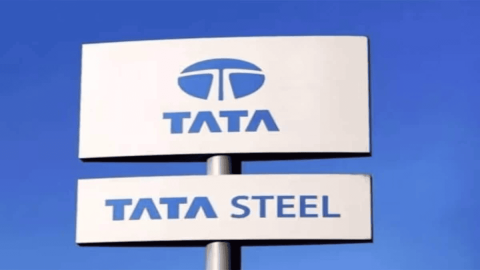Tata Steel Share Price Declines 8.4%; SAIL, NMDC, Jindal Steel and JSW Steel Drop
Tata Steel faced a major selling on Friday as global markets are concerned about trade war initiate by US President Donald Trump's tariffs. The sell-off in metal stocks was triggered by a fresh report that the White House is now considering tariffs on copper. Copper is one of the key commodities that were excluded in the recently announced tariffs. Tata Steel is now looking weak on technical charts. The stock declined 8.43 percent and touched an intraday low at Rs 140. The stock closed near its day's lows, indicating strong selling pressure. SAIL was down by 5 percent while Jindal Steel and Power was down by 5.8 percent. JSW Steel declined 3.42 percent, marking a major shift in investor sentiment on metal stocks.
Tata Steel Faces Rs. 25,000 Crore Tax Reassessment, Moves Bombay High Court to Contest Order
On March 31, 2025, the company received an income tax reassessment order seeking to increase its taxable income by over Rs. 25,000 crore for the financial year 2018–19. Tata Steel has filed a writ petition in the Bombay High Court, citing procedural lapses and asserting that the waiver in question does not constitute taxable income. The case could prove pivotal for corporates involved in acquisitions through the Insolvency and Bankruptcy Code (IBC).
Tax Department Reopens 2018–19 Assessment, Seeks Rs. 25,000 Crore Inclusion
The order issued on March 31, 2025, follows a show cause notice served to Tata Steel on March 13 by the Deputy Commissioner of Income Tax, Circle 2(3)(1), Mumbai. The department is reassessing the company’s financials for Assessment Year 2019–20, contending that the waiver of Rs. 25,185.51 crore in debt, post its acquisition of Bhushan Steel, should be treated as taxable income.
This move comes despite the fact that the Income Tax Return (ITR) of Bhushan Steel for FY 2018–19 had been accepted without objections by the tax authorities back in June 2020.
Background: Bhushan Steel Acquisition and Debt Waiver Context
In May 2018, Tata Steel acquired the then-insolvent Bhushan Steel Limited under IBC proceedings. Upon takeover, a staggering Rs. 25,185.51 crore in liabilities was waived, significantly cleaning up Bhushan Steel’s balance sheet.
Post-acquisition, Bhushan Steel was rebranded as Tata Steel BSL Limited (TSBSL). Subsequently, in November 2021, both TSBSL and Bamnipal Steel Limited were merged into Tata Steel, with an appointed date of April 1, 2019 for the amalgamation.
The reassessment challenge stems from the income tax department’s contention that this debt waiver should be treated as income—a position Tata Steel finds fundamentally flawed.
Tata Steel Challenges Reassessment on Legal and Procedural Grounds
On March 24, Tata Steel filed a writ petition in the Bombay High Court, arguing that the reassessment proceedings suffer from “technical infirmities.” The company maintains that the tax department’s move to reopen a settled assessment—especially one that had been accepted without conditions—is both procedurally irregular and legally questionable.
Further, Tata Steel contends that it will seek all appropriate legal remedies in judicial and quasi-judicial forums, defending the matter both on procedural and substantive legal merits.
Company's Core Argument: Debt Waiver Is Not Taxable Income
Tata Steel has publicly asserted that waiver of debt under insolvency proceedings cannot be treated as income under the Income Tax Act, 1961. The company argues that the waiver was a direct consequence of an IBC-approved resolution plan, and as such, should not attract income tax.
The company emphasized that, as per the law:
Such waivers are capital in nature, not revenue.
The benefit did not arise from routine operations but from a court-approved restructuring.
The accounting treatment under IBC should not automatically imply a taxable event.
This legal interpretation, if upheld, could become a critical precedent for future IBC-led takeovers involving significant debt write-offs.
What Makes This Case Significant for Indian Corporate Law
This tax dispute is not merely about one company’s assessment; it touches on a broader jurisprudential issue—should corporate debt waivers under insolvency schemes be treated as taxable gains?
A decision favoring the tax department could make future IBC acquisitions less attractive, as companies would have to factor in the tax cost of waived liabilities—which are often the only incentive in distressed asset purchases.
Conversely, if the court sides with Tata Steel, it could reinforce confidence in the IBC framework as a tool for debt resolution without creating tax burdens for acquirers.
Stock Market Reaction and Investor Implications
The stock market has responded with measured caution, recognizing both the magnitude of the reassessment and the strength of Tata Steel’s legal stance. At the time of this article, the company’s share price has shown minor volatility but no material selloff, indicating that investors may be viewing the risk as manageable, pending judicial clarification.
Should Tata Steel succeed in contesting the order, it would preserve its balance sheet strength and avoid provisioning for a multi-thousand-crore liability.
The Road Ahead: Litigation, Legal Clarity, and Industry Impact
As the matter progresses through the Bombay High Court and potentially higher courts, its resolution may help define how India’s tax laws interface with insolvency laws. Tata Steel’s legal team is expected to argue that reopening of settled assessments undermines business certainty and investor confidence.
For other corporations pursuing stressed asset acquisitions, this case serves as a reminder to thoroughly assess post-acquisition tax exposures—even when previous tax returns have been accepted without demand.
Bottomline
Tata Steel’s standoff with the tax department over a Rs. 25,000 crore reassessment taps into a much deeper debate on the treatment of debt waivers under insolvency. While the company has mounted a legal challenge rooted in both technical irregularities and statutory protections, the final word will likely come from the courts. Whatever the outcome, the verdict will ripple across India’s corporate restructuring landscape, potentially redrawing the boundaries of tax exposure in IBC-led deals.
